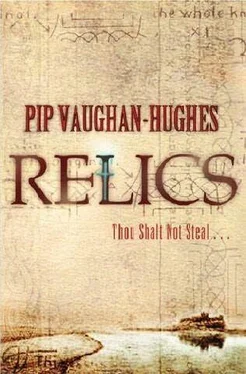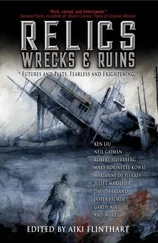Pip Vaughan-Hughes - Relics
Здесь есть возможность читать онлайн «Pip Vaughan-Hughes - Relics» весь текст электронной книги совершенно бесплатно (целиком полную версию без сокращений). В некоторых случаях можно слушать аудио, скачать через торрент в формате fb2 и присутствует краткое содержание. Жанр: Исторический детектив, на английском языке. Описание произведения, (предисловие) а так же отзывы посетителей доступны на портале библиотеки ЛибКат.
- Название:Relics
- Автор:
- Жанр:
- Год:неизвестен
- ISBN:нет данных
- Рейтинг книги:4 / 5. Голосов: 1
-
Избранное:Добавить в избранное
- Отзывы:
-
Ваша оценка:
- 80
- 1
- 2
- 3
- 4
- 5
Relics: краткое содержание, описание и аннотация
Предлагаем к чтению аннотацию, описание, краткое содержание или предисловие (зависит от того, что написал сам автор книги «Relics»). Если вы не нашли необходимую информацию о книге — напишите в комментариях, мы постараемся отыскать её.
Relics — читать онлайн бесплатно полную книгу (весь текст) целиком
Ниже представлен текст книги, разбитый по страницам. Система сохранения места последней прочитанной страницы, позволяет с удобством читать онлайн бесплатно книгу «Relics», без необходимости каждый раз заново искать на чём Вы остановились. Поставьте закладку, и сможете в любой момент перейти на страницу, на которой закончили чтение.
Интервал:
Закладка:
We passed an idle month on our islet. The sun shone every day and I could feel it soaking into me, knitting me back together and lifting my spirits. One morning I felt strong enough to go for a longer walk, and so Anna and I set out from the beach and into the carpet of herbal scrub that blanketed the island. We held each other around the waist and I leaned on a carved stick that Dimitri had found for me.
Where are we going?' asked Anna, as if there was any choice in this Spartan place.
To the hut, of course. I want to see what they are doing there.'
Anna paused. 'How strong do you feel?' she asked me gravely, searching my face with her great brown eyes.
'Strong as an ox,' I told her. I met her gaze. I was definitely feeling better. A tremor of desire flickered, then another. It had been a long time since we had even kissed. I felt another stirring, and realised it was not lust I felt. 'Anna, I love you,' I told her. 'Do you, my little shepherd? My brave little shepherd?'
She was mocking me again. I opened my mouth to answer, but she closed it with a cool finger.
'I've been waiting rather a long time for you to confess that, Petroc. I love you too.'
'Since Bordeaux?' She nodded. 'Since the hermit? I've loved you since then.'
'Since the hermit, my Petroc. Since the beginning.' She was crying. We were both crying like little children. She sniffled and wiped her nose with a sleeve. 'There,' she whispered. 'That wasn't so hard, was it?'
After that, it was a while before we reached the hut. A fresh, well-beaten path led through the tangle of head-high trees to the remains of a wooden gate. One olive tree and one fig grew in the yard before the hut, a squat cube of stone with a roof of shattered pantile patched with furze. Anna knocked and put her head around the door, then beckoned me inside.
It was gloomy in there, and at first I could make out nothing at all. The room was filled with an intense, astringent mineral smell. I wrinkled my nose. A beam of light from the one tiny window angled down and sparkled on what lay heaped the length of a long wooden table in the middle of the room. Someone stepped out of the shadows.
'Step over to the table, Petroc,' said the Captain. 'There is something I wish you to see.'
Moving closer, I could see that the table carried a vast burden of what looked like coarse salt. 'It is natron,' the Captain told me. 'Useful stuff. We carry a few tons as ballast. It is a salt from the lake called El Kab, in Egypt.'^ 'Useful for what?' I asked.
The Captain crooked his finger at me and, leaning on Anna, I joined him, a little reluctantly, at the far end of the table.
'For this,' he said, and pushed aside a portion of the natron. It trickled onto the table with a faint susurrus. I leaned forward to look.
Sir Hugh de Kervezey was asleep under the salt. I choked with shock and pulled away, and Anna barely held me upright.
'I am sorry, Petroc. I did not mean to terrify you. But I wanted you to see. I want you to cast him out of you. He is gone from this body, and from your life.' 'But what are you doing? Why is he here?' 'I will tell you everything,' said the Captain. 'But first, come.'
I steeled myself and shuffled back to the table. At first I could not look, and stared instead at the salt crystals and the way they gleamed listlessly through the gloom. But, like a child, I could not help myself, and my eyes travelled slowly upwards until they rested on the dead face.
He looked peaceful, Sir Hugh, indeed he barely looked like himself any longer. His skin, which had changed to a dull, translucent alabaster yellow, had stretched tight across his skull, and the nose and ears had shrunk in on themselves. His eyes were shut, thankfully. I could not see the crude stitching that had sealed the eye I had taken. I looked up at the Captain, and he nodded gravely. I turned back to the man on the table, and this time saw that Sir Hugh, the man who had scarred my life so deeply, who had lurked in my sleep and idle wakefulness like a flame of evil, always ready to trip me into blind panic, was not here. I had felt his presence in Greenland, out in the midst of the Sea of Darkness. He had been everywhere, but I could not feel him now. He was gone from this body, this room, and from me. I felt a crushing weight rising from my soul, and for the second time that day I sobbed into the living mantle of Anna's hair.
Gilles was right: it was not hard to make a relic. After I had sat down outside and drunk a good draught of wine, they explained it to me. Gilles had been busy in the trees, and he staggered into the yard, arms full of freshly cut pine that drove out the reek of natron from my nostrils. 'It takes a month,' said the Captain.
'Closer to five weeks,' Gilles corrected. 'By that time your body – the body – is completely pickled. The natron has the power to draw every drop of moisture from whatever it touches – we had Kervezey down in the hold with natron on him while we sailed, in case you wondered. If he had started to rot, it would not have worked. You need a fresh corpse…' I waved at him to stop. 'My apologies, Petroc. In any case, Herodotos -we learned of this method from him – says seventy-odd days, but that is unnecessary and the old Greek is a horrible exaggerator.'
'And then what?' said Anna. She was free of any squeamish-ness, I knew: if anything, she found the whole thing delightfully fascinating.
At the end of the month, or five weeks, or whenever the corpse is ready, it is, as I said, completely pickled. But it looks like wax, as you saw, like the skin of a salted prosciutto. That is what it is, really – cured ham. So you need to make it look old. The ancients bandaged their dead and poured tars and resins over them to preserve them that way. We don't have time for that. Think of hams again, Patch. Do you see? We smoke our corpse over pine and various other things – frankincense, myrrh, spices – that darken it and give it that nice smell: the odour of sanctity, yes? We give our clients what they want, you know. And so: a perfect relic' 'Do you do this a lot?' I asked. I was finding it hard to digest this information, and I hoped I would be able to eat ham again.
'Only in an emergency. Occasionally for other reasons,' said the Captain. 'The reason now is that we need a Saint Exuperius, and, if you remember, no such fellow ever lived.'
We do not have Cordula,' said Gilles, seeing my bafflement. 'So we need Exuperius. And because we could rifle every grave in Christendom and never find him, we are at liberty to conjure him into existence.'
'And he is going to smell lovely,' Anna said, and raised her cup towards the hut where the natron was going about its slow, careful work.
It took thirty-three days in the natron before Exuperius was hung, with little ceremony, from the rafters of the hut. The table was carried out and the natron, all 600 pounds of it, dumped into the sea. Then Gilles sealed the window and lit a fire in the stone trough. He fussed over it until it burned with a low smoulder and then arranged the green pine wood and a scattering of the aromatics. One of those I recognised: the grey-leaved plant with pink flowers that had broken my fall to the beach on Koskino. It was myrrh.
Then we watched as the white smoke began to seep, and then billow, through the holes in the roof. A week went by, and we all smelled of the fragrant smoke before the fire was allowed to die and the body carried out, as black as the ancient corpses of Egypt. Gilles rinsed the soot away with retsina, and I took one end of the stretcher that carried our new saint aboard the Cormaran. We were ready to sail, and Nizam had plotted our course: we would postpone Venice, and head back across the warm Mediterranean to the Pillars of Hercules and further, past the Bay of Biscay, past Bordeaux and up to the misty Channel, where one day I would see Start Point rear out of the furrowed green ocean and know it pointed the way to my home. Perhaps I would even see the gentle rounded shoulders of the moor, fading to blue in the far distance. And for a while longer, Anna would be by my side.
Читать дальшеИнтервал:
Закладка:
Похожие книги на «Relics»
Представляем Вашему вниманию похожие книги на «Relics» списком для выбора. Мы отобрали схожую по названию и смыслу литературу в надежде предоставить читателям больше вариантов отыскать новые, интересные, ещё непрочитанные произведения.
Обсуждение, отзывы о книге «Relics» и просто собственные мнения читателей. Оставьте ваши комментарии, напишите, что Вы думаете о произведении, его смысле или главных героях. Укажите что конкретно понравилось, а что нет, и почему Вы так считаете.












